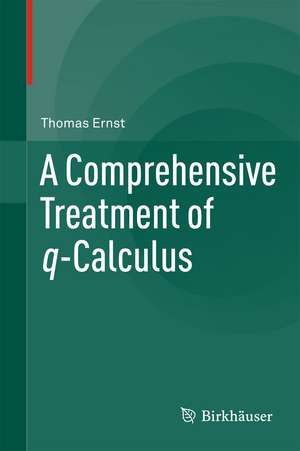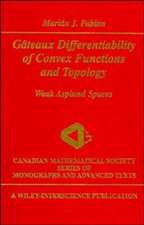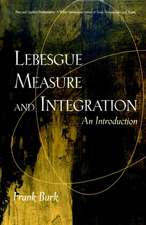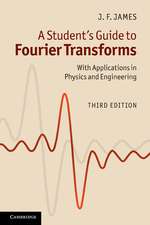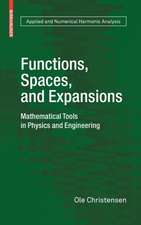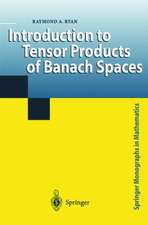A Comprehensive Treatment of q-Calculus
Autor Thomas Ernsten Limba Engleză Paperback – 14 oct 2014
The book covers many topics on q-calculus, including special functions, combinatorics, and q-difference equations. Apart from a thorough review of the historical development of q-calculus, this book also presents the domains of modern physics for which q-calculus is applicable, such as particle physics and supersymmetry, to name just a few.
| Toate formatele și edițiile | Preț | Express |
|---|---|---|
| Paperback (1) | 650.69 lei 6-8 săpt. | |
| Springer – 14 oct 2014 | 650.69 lei 6-8 săpt. | |
| Hardback (1) | 651.51 lei 6-8 săpt. | |
| Springer – 7 sep 2012 | 651.51 lei 6-8 săpt. |
Preț: 650.69 lei
Preț vechi: 765.51 lei
-15% Nou
Puncte Express: 976
Preț estimativ în valută:
124.51€ • 130.33$ • 103.63£
124.51€ • 130.33$ • 103.63£
Carte tipărită la comandă
Livrare economică 31 martie-14 aprilie
Preluare comenzi: 021 569.72.76
Specificații
ISBN-13: 9783034808064
ISBN-10: 3034808062
Pagini: 508
Ilustrații: XVI, 492 p.
Dimensiuni: 155 x 235 x 30 mm
Greutate: 0.7 kg
Ediția:2012
Editura: Springer
Colecția Birkhäuser
Locul publicării:Basel, Switzerland
ISBN-10: 3034808062
Pagini: 508
Ilustrații: XVI, 492 p.
Dimensiuni: 155 x 235 x 30 mm
Greutate: 0.7 kg
Ediția:2012
Editura: Springer
Colecția Birkhäuser
Locul publicării:Basel, Switzerland
Public țintă
ResearchCuprins
1 Introduction.- 2 The different languages of q.- 3 Pre q-Analysis.- 4 The q-umbral calculus and the semigroups. The Nørlund calculus of finite diff.- 5 q-Stirling numbers.- 6 The first q-functions.- 7 An umbral method for q-hypergeometric series.- 8 Applications of the umbral calculus.- 9 Ciglerian q-Laguerre polynomials.- 10 q-Jacobi polynomials.- 11 q-Legendre polynomials and Carlitz-AlSalam polynomials.- 12 q-functions of many variables.- 13 Linear partial q-difference equations.- 14 q-Calculus and physics.- 15 Appendix: Other philosophies.
Textul de pe ultima copertă
To date, the theoretical development of q-calculus has rested on a non-uniform basis. Generally, the bulky Gasper-Rahman notation was used, but the published works on q-calculus looked different depending on where and by whom they were written. This confusion of tongues not only complicated the theoretical development but also contributed to q-calculus remaining a neglected mathematical field. This book overcomes these problems by introducing a new and interesting notation for q-calculus based on logarithms. For instance, q-hypergeometric functions are now visually clear and easy to trace back to their hypergeometric parents. With this new notation it is also easy to see the connection between q-hypergeometric functions and the q-gamma function, something that until now has been overlooked.
The book covers many topics on q-calculus, including special functions, combinatorics, and q-difference equations. Beyond a thorough review of the historical development of q-calculus, it also presents the domains of modern physics for which q-calculus is applicable, such as particle physics and supersymmetry, to name just a few.
The book covers many topics on q-calculus, including special functions, combinatorics, and q-difference equations. Beyond a thorough review of the historical development of q-calculus, it also presents the domains of modern physics for which q-calculus is applicable, such as particle physics and supersymmetry, to name just a few.
Caracteristici
Covers many topics on q-calculus, i.e. special functions, combinatorics, q-difference equations and q-Bernoulli numbers
Detailed coverage of the historical development of q-calculus
Summarizes the domains of moderns physics for which q-calculus is applicable, i.e. particle physics and supersymmetry
Introduction of a new logarithmic notation for q-calculus that supersedes the older Gaspar-Rahman notation
Includes supplementary material: sn.pub/extras
Detailed coverage of the historical development of q-calculus
Summarizes the domains of moderns physics for which q-calculus is applicable, i.e. particle physics and supersymmetry
Introduction of a new logarithmic notation for q-calculus that supersedes the older Gaspar-Rahman notation
Includes supplementary material: sn.pub/extras
